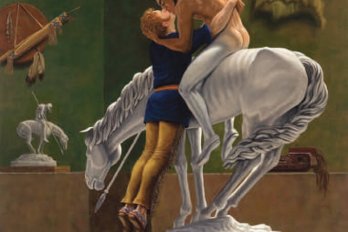San Luca—Rocco Romeo carries his silver-plated pistol in a leather holster, stowed in a glove compartment within arm’s reach of the driver’s seat. It’s a wise precaution, given our destination. We are sharking along twisty mountain roads through gales of pelting rain toward San Luca, a village known as the casa madre of the mafia that holds the tip of Italy’s boot in an iron grip. A stocky man with a Lenin goatee and tight-lipped demeanour, Romeo is a deputy police chief of nearby Siderno and a tactician in Italy’s escalating war against the ’Ndrangheta.
Founded in the late 1800s as vigilante associations that shielded Calabria’s peasants from greedy land barons, the ’Ndrangheta eventually morphed into parasitic criminal clans. Today their estimated 10,000 members, distributed across 150 families—blood remains the primary criterion for recruitment—eclipse Sicily’s Cosa Nostra in power and influence, generating over $50 billion a year from legitimate and illegal enterprises, including extortion, nuclear waste trading, and weapons and drug trafficking (Italian magistrates believe that as much as 80 percent of the cocaine entering Europe is imported by the ’Ndrangheta). And the organization has crept beyond Italy’s borders, establishing outposts across Europe, South America, the US, Australia, and Canada.
Last August, the ’Ndrangheta boosted its international profile when six members of a San Lucan clan were machine-gunned down by rival clansmen outside a restaurant in Duisburg, Germany. Whoever wins this long-running blood feud will have considerable sway over the ’Ndrangheta stronghold of San Luca, but the massacre may have been aiming higher. “Duisburg was a big, big marketing event,” Alberto Cisterna, a magistrate with the National Anti-Mafia Directorate, told me when we met in Rome. “It was designed to say that people belonging to the ’Ndrangheta should be feared all over the world.” In response, the carabinieri, Italy’s military police, stormed San Luca and arrested thirty-two people, some of whom were found hiding in underground bunkers.
San Luca has been a village under siege ever since. Indeed, turning a bend in the road on our approach, we are surprised by a cluster of grim-faced carabinieri. Attired in grey uniforms with bulletproof vests, hands hovering near their firearms, these officers are part of a dragnet designed to catch ’Ndrangheta leaders still wanted in connection with the Duisburg massacre. Their expressions soften when they spot Romeo at the wheel. He’s well respected among the carabinieri, having once personally arrested a powerful ’Ndrangheta boss whose unfinished mansion still stands on a busy intersection outside Siderno.
We see little evidence of the ’Ndrangheta’s wealth in San Luca, where boxy houses perch precariously on the mountainside overlooking a verdant valley. The deluge has stopped, but the sky is a menacing grey. Old men clustered in the piazzas stare balefully at us as we drive through.
The only one of San Luca’s 4,185 residents willing to answer questions about the ’Ndrangheta is the village pastor, and even he requires some cajoling. Born and bred here, Don Pino Strangio has a peasant’s face and a booming voice. He welcomes us warmly into the modest, yellow-painted monastery that stands on the highest point in town. But being the “mafia priest,” as he’s been labelled by the press, puts him in a somewhat difficult position: no matter how abhorrent the ’Ndrangheta’s activities, he has to remain supportive of his flock. After all, they wouldn’t hesitate to kill him. Seventeen years ago, the ’Ndrangheta firebombed his car to test his commitment.
Sitting across a desk from each other in a barren vestibule, Strangio and Romeo—old acquaintances—banter cordially. But Duisburg and the feud that led to it soon steal into the conversation. It started back in 1991, when teenagers from the Nirta-Strangio clan threw eggs at a bar controlled by the Vottari-Pelle clan. Soon afterwards, the kids were shot dead, with more cadavers to follow. The dispute had all but sputtered out by Christmas Day 2006, when Maria Strangio, the wife of a clan leader, was murdered on her front stoop by gunmen on motorbikes. The Nirta-Strangio family tracked down one of her assassins in Germany.
“We have to get rid of [the ’Ndrangheta]!” Strangio thunders from his seat below a large picture of Christ. He quickly adds, more judiciously, “We have to condemn every form of crime organization that exists.” Before Romeo can prod further, we are interrupted by a teenage girl, friend in tow, who politely asks Strangio if she may sing in the nave. The pastor nods and, once they exit, tells us in a hushed voice, “Her brother was one of the men killed at Duisburg.” In a moment, the girl’s mournful voice fills the church.




